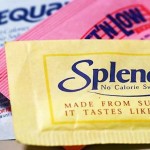HEALTH NEWS YOU CAN USE- Eating Well
By: Dr. Robert Neposlan
Aspartame has been around for several decades now, and for the most part, millions of its users have no idea of how dangerous this food additive is. If you are currently consuming aspartame in ANY of the 6,000 plus products it’s found, you will want to read on.
I first learned of aspartame’s potential side effects by experience back in the early 1990’s while in Chiropractic School. I had a chum classmate who loved to play racquetball as much as I. We would play for hours and work up quite a sweat, and thirst. Being the health conscious guy I was, or so I thought, I opted for a water based beverage flavored and sweetened by aspartame. I should note that I also have a tendency t o dehydrate easily. And so as we would get together for our regular weekly game, I felt that the headaches I was experiencing after racquetball were a result of just not drinking enough. And so in subsequent games I would bring two bottles of my beverage choice (containing aspartame). I soon realized that the more I drank the worse my headaches were becoming. In fact, there were times I could not finish the game because of the pounding I experienced. It didn’t take long to figure out it had to be something in what I was drinking. Here is what my research found:
o dehydrate easily. And so as we would get together for our regular weekly game, I felt that the headaches I was experiencing after racquetball were a result of just not drinking enough. And so in subsequent games I would bring two bottles of my beverage choice (containing aspartame). I soon realized that the more I drank the worse my headaches were becoming. In fact, there were times I could not finish the game because of the pounding I experienced. It didn’t take long to figure out it had to be something in what I was drinking. Here is what my research found:
Aspartame Is By Far, the Most Dangerous Substance On the Market That Is Added To Foods. Period!!!
Aspartame is the technical name for the brand names, NutraSweet, Equal, Spoonful, and Equal-Measure. Aspartame was discovered by accident in 1965, when James Schlatter, a chemist of G.D. Searle Company was testing an anti-ulcer drug. Aspartame was approved for dry goods in 1981 and for carbonated beverages in 1983. It was originally approved for dry goods on July 26, 1974, but objections filed by neuroscience researcher Dr John W. Olney and Consumer attorney James Turner in August 1974 as well as investigations of G.D. Searle’s research practices caused the US Food and Drug Administration (FDA) to put approval of aspartame on hold (December 5, 1974). In 1985, Monsanto purchased G.D. Searle and made Searle Pharmaceuticals and The NutraSweet Company separate subsidiaries.
Aspartame accounts for over 75 percent of the adverse reactions to food additives reported to the US Food and Drug Administration (FDA). Many of these reactions are very serious including seizures and death as recently disclosed in a February 1994 Department of Health and Human Services report.(1) A few of the 90 different documented symptoms listed in the report as being caused by aspartame include: Headaches/migraines, dizziness, seizures, nausea, numbness, muscle spasms, weight gain, rashes, depression, fatigue, irritability, tachycardia, insomnia, vision problems, hearing loss, heart palpitations, breathing difficulties, anxiety attacks, slurred speech, loss of taste, tinnitus, vertigo, memory loss, and joint pain.
According to researchers and physicians studying the adverse effects of aspartame, the following chronic illnesses can be triggered or worsened by ingesting of aspartame:(2) Brain tumors, multiple sclerosis, epilepsy, chronic fatigue syndrome, parkinson’s disease, alzheimer’s, mental retardation, lymphoma, birth defects, fibromyalgia, and diabetes.
Aspartame is made up of three chemicals: Aspartic acid, phenylalanine, and methanol. The book, Prescription for Nutritional Healing, by James and Phyllis Balch, lists aspartame under the category of “chemical poison.” As you shall see, that is exactly what it is.
ASPARTIC ACID (40% OF ASPARTAME)
Dr Russell L. Blaylock, a professor of Neurosurgery at the Medical University of Mississippi, recently published a book thoroughly detailing the damage that is caused by the ingestion of excessive aspartic acid from aspartame. [Ninety nine percent of monosodium glutamate 9MSG) is glutamic acid. The damage it causes is also documented in Blaylock’s book.] Blaylock makes use of almost 500 scientific references to show how excess free excitatory amino acids such as aspartic acid and glutamic acid in our food supply are causing serious chronic neurological disorders and a myriad of other acute symptoms.(3)
SUMMARY OF HOW ASPARTATE (AND GLUTAMATE) CAUSE DAMAGE
Aspartate and glutamate act as neurotransmitters in the brain by facilitating the transmission of information from neuron to neuron. Too much aspartate or glutamate in the brain kills certain neurons by allowing the influx of too much calcium into the cells. This influx triggers excessive amounts of free radicals which kill the cells. The neural cell damage that can be caused by excessive aspartate and glutamate is why they are referred to as “excitotoxins.” They “excite” or stimulate the neural cells to death.
Aspartic acid is an amino acid. Taken in its free form (unbound to proteins) it significantly raises the blood plasma level of aspartate and glutamate. The excess aspartate and glutamate in the blood plasma shortly after ingesting aspartame or products with free glutamic acid (glutamate precursor) leads to a high level of those neurotransmitters in certain areas of the brain.
The blood brain barrier (BBB) which normally protects the brain from excess glutamate and aspartate as well as toxins 1) is not fully developed during childhood, 2) does not fully protect all areas of the brain, 3) is damaged by numerous chronic and acute conditions, and 4) allows seepage of excess glutamate and aspartate into the brain even when intact.
The excess glutamate and aspartate slowly begin to destroy neurons. The large majority (75%+) of neural cells in a particular area of the brain are killed before any clinical symptoms of a chronic illness are noticed. A few of the many chronic illnesses that have been shown to be contributed to by long-term exposure excitatory amino acid damage include:
Multiple sclerosis (MS), ALS, memory loss, hormonal problems, hearing loss, epilepsy, Alzheimer’s disease, Parkinson’s disease, hypoglycemia, AIDS dementia, brain lessions, and neuroendocrine disorders.
The risk to infants, children, pregnant women, the elderly, and persons with certain chronic health problems from excitotoxins are great. Even the Federation of American Societies For Experimental Biology (FASEB), which usually understates problems and mimics the FDA party-line, recently stated in a review that “it is prudent to avoid the use of dietary supplements of L-glutamic acid by pregnant women, infants, and children. The Existence of evidence of potential endocrine responses, i.e., elevated cortisol and prolactin, and differential responses between males and females, would also suggest a neuroendocrine link and that supplemental L-glutamic acid should be avoided by women of childbearing age and individuals with affective disorders.”(4) Aspartic acid from aspartame has the same deleterious effects on the body as glutamic acid.
The exact mechanism of acute reactions to excess free glutamate and aspartate is currently being debated. As reported to the FDA, those reactions include:(5) Headaches/migraines, nausea, abdominal pains, fatigue (blocks sufficient glucose entry into brain), sleep problems, vision problems, anxiety attacks, depression, and asthma/chest tightness.
One common complaint of persons suffering from the effect of aspartame is memory loss. Ironically, in 1987, G.D. Searle, the manufacturer of aspartame, undertook a search for a drug to combat memory loss caused by excitatory amino acid damage. Blaylock is one of many scientists and physicians who are concerned about excitatory amino acid damage caused by ingestion of aspartame and MSG. A few of the many experts who have spoken out against the damage being caused by aspartate and glutamate include Adrienne Samuels, Ph.D., an experimental psychologist specializing in research design. Another is Olney, a professor in the department of psychiatry, School of Medicine, Washington University, a neuroscientist and researcher, and one of the world’s foremost authorities on excitotoxins. (He informed Searle in 1971 that aspartic acid caused holes in the brain of mice.)
With this information, it is my hope that you all consider reverting to healthier alternatives to sweeteners. Organic honey is one great alternative, with many proven health benefits.
Until next week,
Eat Well
Dr. Rob
